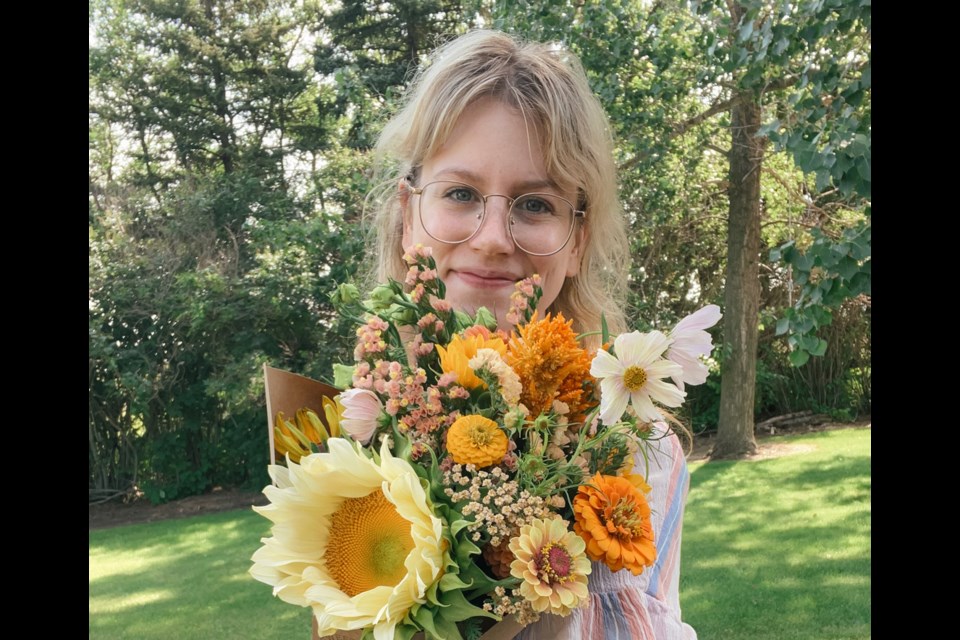REDVERS - Fabled Acres Flower Farm is a new concept to the Prairies, albeit a simple one: go to the farm to cut your own long-stem, florist-quality flowers.
Alesha Boettcher, the owner and operator, will teach customers how to cut and process fauna and when you have got enough, you can sit at the table and make yourself a stunning arrangement.
“It’s really the experience you are coming out for,” said Boettcher. “I call it my secret garden. People come to ground themselves in nature.”
Though she does sell to some flower shops, these flowers will be fresher and longer lasting than anything at a florist because customers cut them. At the end you may have just got all your flowers for the wedding or made a beautiful bouquet for yourself or someone you love. The farm is expected to be open in early July and run until the first frost.
Boettcher started at her parents’ place near Carievale, but now with the new farm has opened the new business just outside Redvers. It all started with looking online, Boettcher said.
“I couldn’t believe that this was a job. people can do this? It was amazing to me. I just decided I was going to do it, if they can do it then I can,” she said.
That first year she wasn’t sure if anything would work,
“Last year was a test year, maybe the flowers wouldn’t grow, maybe everyone would think this was too weird and not come. But everything went amazingly and the local communities have been so supportive,” she said.
She has had people come out for a bachelorette party and a ladies’ night; she even is planning some moms and tots days. For weddings, Boettcher can prepare buckets of flowers with the colour scheme for people to arrange themselves, or because she has been studying as a florist, she can cut and arrange everything for the big day.
There is also an interested bouquet subscription. If you want to give the gift of flowers or receive them, every two weeks you will receive an already arranged bouquet, for a total of four bouquets from July to early September.
Boettcher has always been a farmer but growing this type of flowers is a lot more challenging.
“They grow differently and you have to know how to handle each flower,” said Boettcher.
She starts growing inside in December. Everything on the farm was started from seed or bulb. It takes a year to prep for the coming year.
“The flowers take a long time to start growing but it is worth it because they are so beautiful,” she said.
When Boettcher started, “it was a lot of trial and error but it is very fulfilling to work outside. The flower farming business in new to Canada and some businesses will not even sell seeds to our country,” she said. “I had to find the growers with the special seeds and I contacted a lot of suppliers and grow my own network. It’s been really nice talking to other flower farmers, it’s a pretty small community but it’s growing exponentially.”
The experience is part beauty and part educational. Boettcher will show you all that needs to be done from cutting properly to debudding and processing.
“We cut in the evening or the morning because otherwise it is too hot and the flowers will just melt. They follow me around the field for a bit and get the lesson and then they go at it.”
People can go online to reserve a seat for a cutting time or book a private session if they have a bigger party.
“I like showing people different flowers that they didn’t know they could grow here and then next year they grow it themselves. I enjoy the educational side of people coming out here,” said Boettcher.
“I’m really into sustainability and bartering, field to table. I really want to nurture and encourage that. I like that we are getting back to our roots.”
These are also practices that she uses throughout her farm. Her sister had a large vegetable garden last year and Boettcher didn’t have time to grow her own, so exchanged bulbs for her sister’s corn.
“We are as eco-friendly as possible. We don’t use pesticides and we make some of our own fertilizer, which is a compost tea.”
They also use all-naturel fish emulsion and worm-casing powder.
She also practises cover crops, which involves always making sure the soil has a crop on it.
“It is a natural way to amend the soil especially here because the wind is so bad.”
Cover crops pull moisture in the soil and keeps it from eroding. Once you have grown your cover crop, you can till or mow it straight into the soil, adding organic matter and putting whatever nutrients that were deficient in back into the ground.




